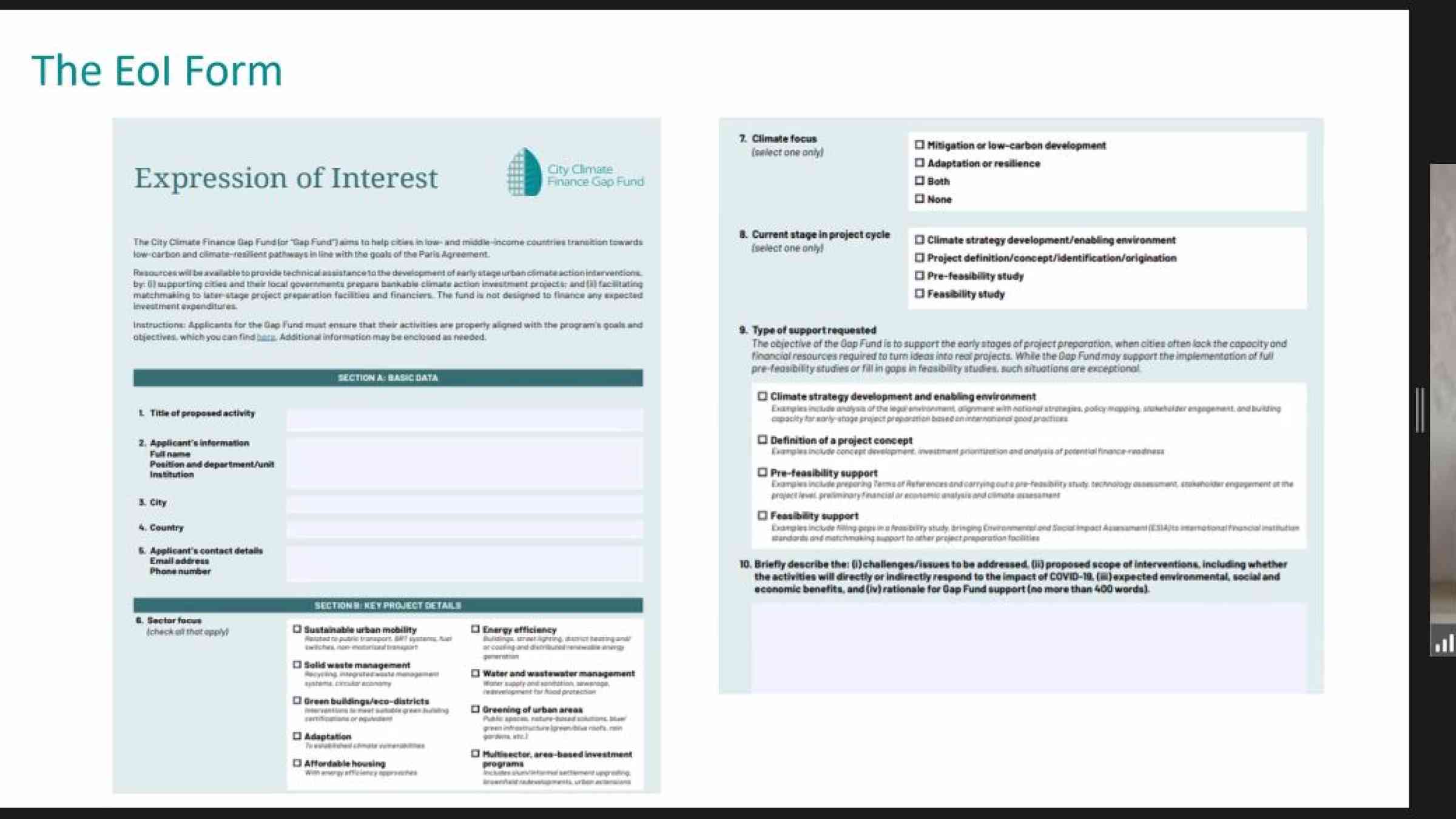MCR2030 Webinar Series: Getting to know the City Climate Finance Gap Fund

On 28 July 2021, UNDRR GETI together with the World Bank, the European Investment Bank, and the Global Covenant of Mayors for Climate and Energy (GCoM) conducted a webinar session on the City Climate Finance Gap Fund (Gap Fund). The session was part of the Making Cities Resilient 2030 (MCR2030) webinar series.
During the session the speakers provided in-depth information about the Gap Fund, its goals and purpose as well as how to access Gap Fund support. The Gap Fund was launched in September 2020 and it aims to support cities in low and middle-income countries to strategise, plan and prepare climate mitigation and adaptation projects. While it does not provide direct funding for implementation, it provides a range of technical assistance and capacity building to support climate-smart planning and investment in cities.
The Gap Fund is listed under the MCR2030 dashboard and is open for MCR2030 cities at Stage C. These are cities that have already run the resilience diagnostics, using different tools, including the Disaster Resilience Scorecard for Cities, made available by partners.. Furthermore, these cities must have set priorities for risk reduction and resilience planning and be in position to articulate well the evidence of their needs and their commitments.
During the session Asma Jhina, City Resilience and Climate Finance Advisor from Global Covenant of Mayors for Climate and Energy, highlighted that the Gap Fund supports city and local governments facing barriers to financing for climate-smart projects. She also added that close collaboration with the Making Cities Resilient 2030 will ensure that cities have access to the tools, knowledge and resources that can make these ambitions a reality.
Margarita Cantada, Urban Specialist, World Bank, said: “The City Climate Finance Gap Fund seeks to unlock more than EUR 4 billion to transform urban climate aspirations into finance-ready projects. The EIB and the WB are working together to support cities in low and middle-income countries in planning, conceptualising and scoping their climate mitigation and adaptation projects.”
“Cities are central to meeting the Paris Agreement’s targets, yet they often struggle to turn their ideas into low-carbon and resilient projects. Many project preparation facilities focus on projects at the feasibility stage. The Gap Fund aims to complement the existing offer by providing early-stage support. ”, emphasised Giulia Macagno, Senior Economist & Head of the City Climate Finance Gap Fund EIB Technical Secretariat
The webinar was attended by 206 participants from 79 countries and territories across the globe. Sanjaya Bhatia, Head of the Global Education and Training Institute, UNDRR, shared that understanding various options to access finance can help cities overcome the challenge for implementing actions to enhance resilience. The MCR2030 Webinar Series will continue to share knowledge and tools made available by the MCR2030 partners.
Background information
Making Cities Resilient 2030 (MCR2030) is a unique cross-stakeholder initiative for improving local resilience. Aiming to alleviate common pain points of cities and urban resilience partners, MCR2030 offers a 3-stage resilience roadmap that guides cities step-by-step in their journey to resilience with open spaces for all partners to bring in matching expertise. MCR2030 utilizes a dashboard, an online platform, to facilitate exchanges of cities and partners and facilitates improved access to resources and tools that can help cities improve advocacy, share knowledge and experiences, establish mutually reinforcing city-to-city learning networks, access technical expertise, connect multiple layers of government and build partnerships. MCR2030 is operational from January 2021 until the end of 2030.
For more information please contact:
MCR2030 Global Secretariat at [email protected]
The Making Cities Resilient 2030 (MCR2030) https://mcr2030.undrr.org
The City Climate Finance Gap Fund (Gap Fund) https://www.citygapfund.org/

